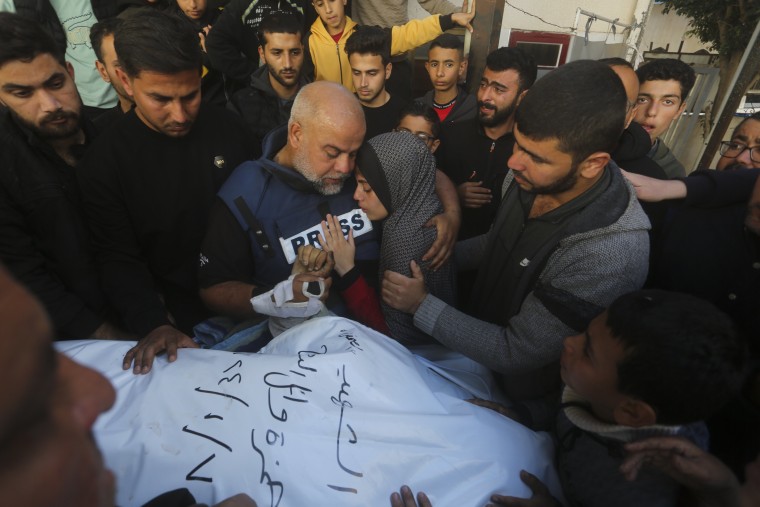After losing his wife, 15-year-old son, 7-year-old daughter and a grandson in Israeli airstrikes since Oct. 7, Al Jazeera Gaza bureau chief Wael Al Dahdouh has come to embody the painful personal sacrifices that have come with covering Israel’s assault on the Gaza Strip.
“The cost is very high, but at the end of the day we ask ourselves, what is the other option?” he told NBC News’ Ayman Mohyeldin. “We sit in our homes, waiting for missiles to land, leave this job, give up this humanitarian message that we delivered? This is definitely not an option.”
In a wide-ranging exclusive interview with Mohyeldin — his first and only with Western media — Al Dahdouh talked about reporting on the front lines of the historic war between Israel and Hamas and described the painful emotional toll of unspeakably personal tragedy.
Al Dahdouh has become a globally recognized symbol of an unprecedented toll: 82 journalists killed since Oct. 7, according to the Committee to Protect Journalists.
If he hadn’t already borne enough loss, Al Dahdouh’s 27-year-old son, Hamza Dahdouh — also a journalist and cameraman with Al Jazeera — was killed last week alongside his colleague, Mustafa Thuraya, by an Israeli airstrike. They were in a car, driving to report near the southern city of Rafah.

Initially, the Israeli military alleged that the younger Dahdouh and Thuraya were members of Palestinian militant groups.
Al Jazeera issued a statement strongly condemning and rejecting what it says are Israel’s misleading attempts to justify the killing of its journalists.
Despite his tremendous personal losses, Al Dahdouh has continually returned to the airwaves and remains steadfast in his commitment to covering Israel’s bombardment of Gaza.
“I did not use this platform, this respectful platform, as a platform for revenge,” he said. “The pain was more than what I could bear. But at the end of the day, I came back, carrying out my tasks and job.”
Al Dahdouh says he perseveres because of the many sacrifices his family made in order for him to do this difficult and dangerous work, including his fatherly duties.
“They hardly saw me,” he said. “They got used to that, and they suffered. This is a very big sacrifice they made, and they made that sacrifice to enable me to continue my job.”
“So when the time comes and their blood sheds and their lives are sacrificed, I should leave them and give up this job? Never,” he added.
Journalists and press freedom groups across the world have issued statements of solidarity and denounced what the Committee to Protect Journalists has described as the “apparent targeting of journalists reporting on the war” and their families. Although there is some degree of support from journalists internationally, Al Dahdouh says it’s not enough to help reporters on the ground who are under constant threat of being targeted or killed.
“Many Palestinian journalists feel that we were let down, left alone to face this massacre and this carnage, and the world did not look at the bigger picture, did not really stand by us as we would have liked,” he told Mohyeldin. “We feel that we are being killed twice: once by the bombs, and once by this silence, this shy way of expressing support.”
Al Dahdouh says President Joe Biden — “the president of the most powerful state in the world” — should look closely at what is happening on the ground and listen to both sides of the narrative, not just one.
“I paid a very high cost for the weapons which targeted where my family was and destroyed it, leveled it to the ground without prior warning,” he said. The Biden administration bypassed Congress twice last month to provide an emergency arms sale to Israel.
“I advise the president to look at what’s happening, to listen to people, ordinary people, who are paying the cost. They have every right to secure their rights as human beings, as partners in humanity. Nothing more, nothing less.”
During his most recent Middle East trip, Secretary of State Antony Blinken said the deaths of Wael Dahdouh’s sons and other family members were “the worst possible loss.” Blinken added that he had raised the deaths of journalists on his trip to the Middle East.






